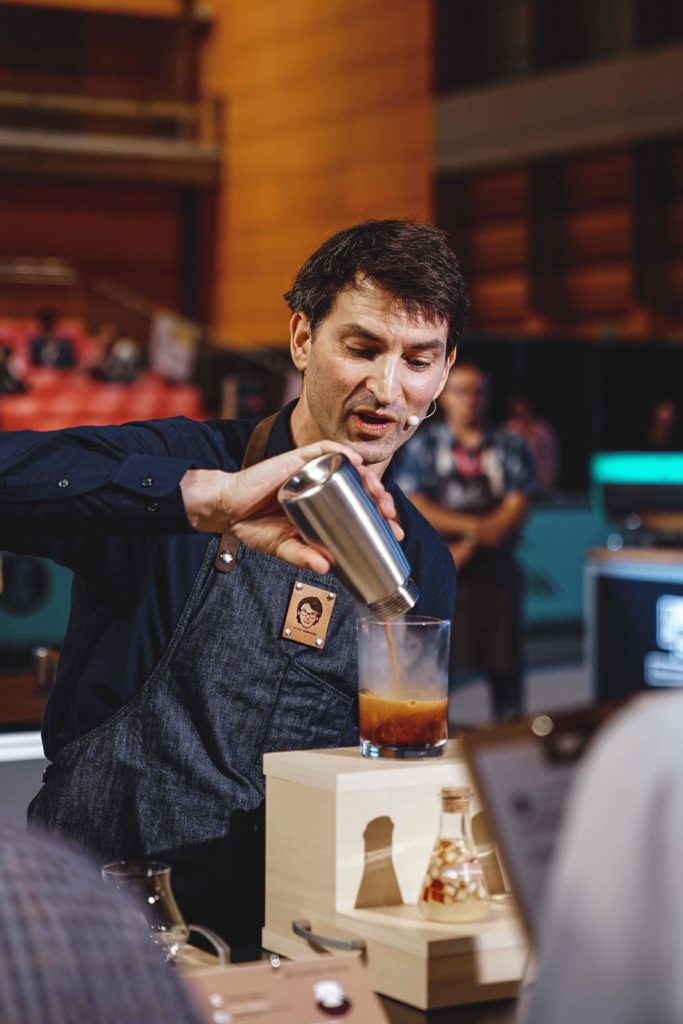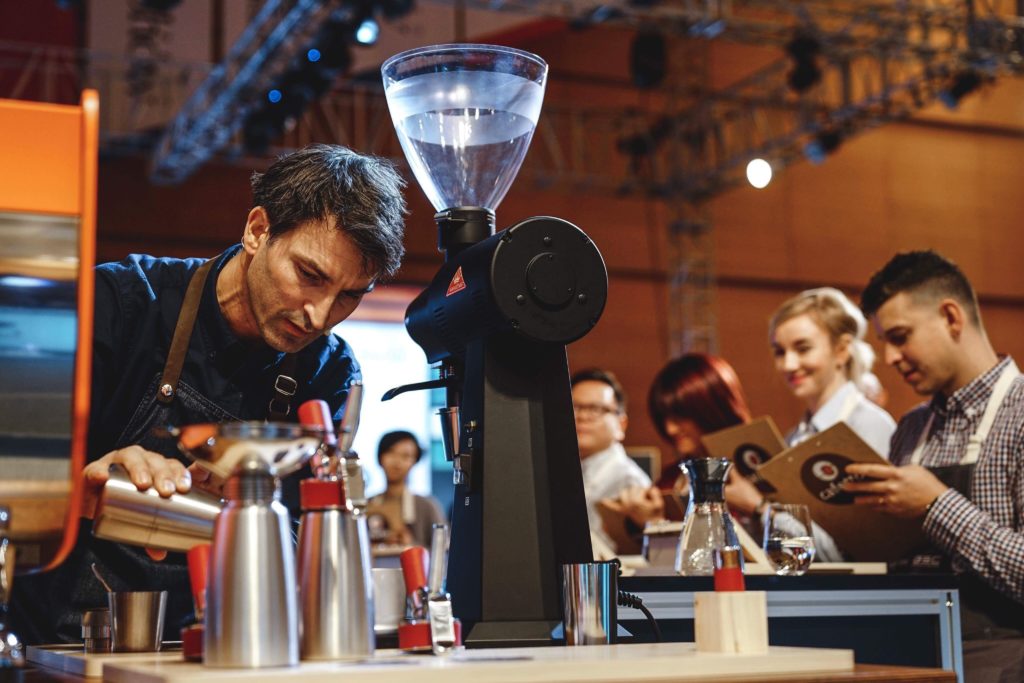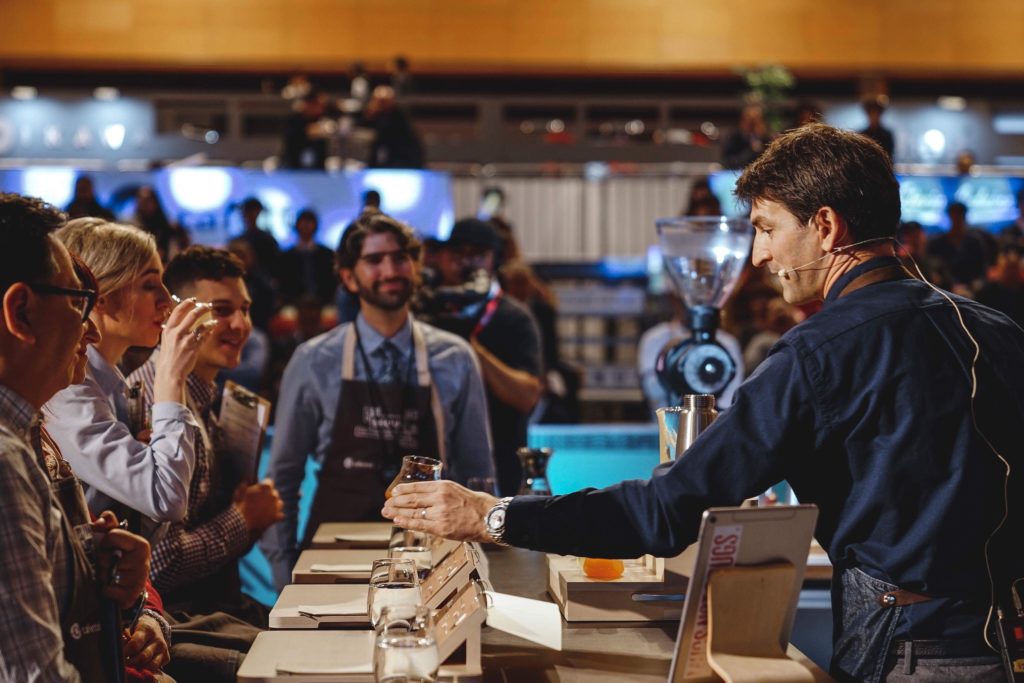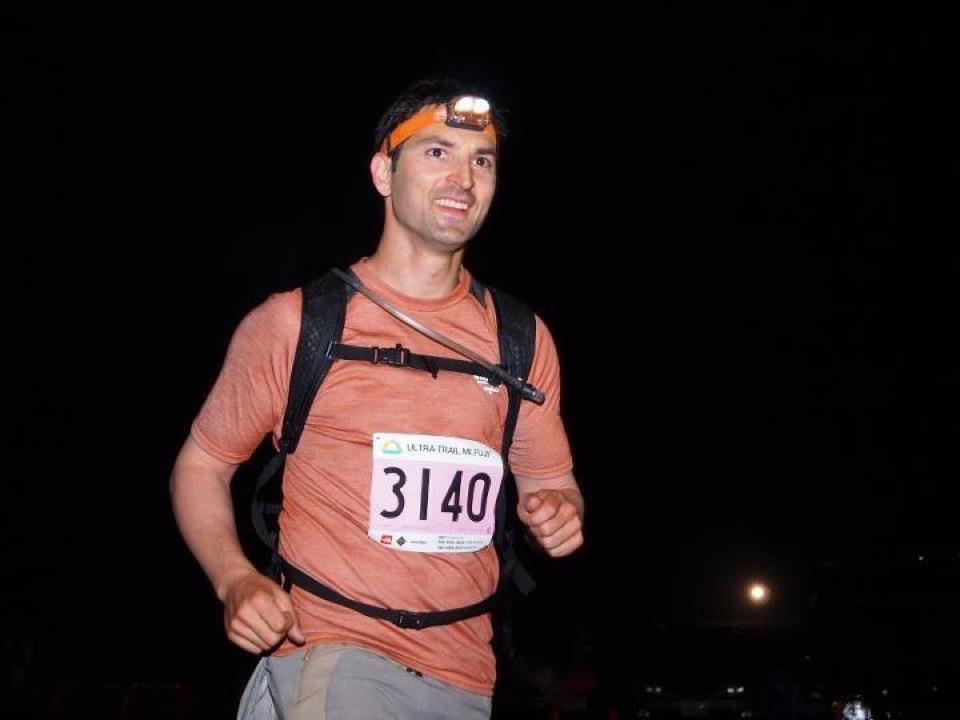Andre Eiermann is a marketing director at UCC Switzerland, Swiss Barista Champion in 2017, Q Grader, SCA trainer, runner, husband, father and a part-time scientist. Seems like this man has more than 24 hours in a day, doing so many things at the same time. He has gone through many professions and luckily he always finds his way back to coffee. We talked with Andre about his experience and ever-evolving knowledge of coffee.

Could you please introduce yourself? Where are you from and how is the coffee culture there?
My name is Andre and I am currently living with my wife and our two kids in Berne, the capital of Switzerland. Originally I was born and raised in Switzerland. After having lived in various countries abroad – Kenia, Tanzania, England, France and Germany – I decided to come back to my roots before starting my next adventure. Although Switzerland is relatively small, the country is very diverse and our four official national languages enrich this diversity even more. In general Swiss people drink a lot of coffee. They especially like the Italian espresso culture – dark roasts and a certain robusta content. We even have our own “national” coffee beverage called “Cafe Creme”. This coffee is a very long lungo, that is usually drunk with some creme and sugar. Specialty coffee is still very small in Switzerland. There is just a handful of specialty coffee roasters and around a dozen of speciality coffee shops. But I can sense, that our community is growing and definitely on the move to make speciality coffee bigger.
Where, when and how did you first tried coffee in your life? Did you like it?
During university I would have never imagined, that I will work one day in coffee. Until then I have not even drunk one single sip of coffee. But it all turned out differently after several uninspiring interviews with big multinational marketing companies, a headhunter organized an interview with Volcafe – one of the biggest green coffee trading houses worldwide. During that meeting with the vice president I have drunk my very first cup of coffee. I remember well, that I have not particularly liked it. Nevertheless I got the job and immediately started my professional career as a Junior Coffee Trader and embarked on my coffee journey.
As your background is related to politics, what made you interested in coffee as a career path and not just a hobby?
Indeed, I have studied economics and political science. But it was the conversation with the Vice President of Volcafe that made me interested in coffee. I was totally fascinated by the breathtaking and adventurous stories he told me about the coffee origins and above all about the unique people involved in the coffee industry. I tried later to escape the coffee industry several times. I worked as a fashion photographer, in the Swiss watch industry and also in cosmetics. But I missed the coffee world co much, that I had to go back to coffee.
When and for how long you worked for L’Oreal? What did you learn there that helped you in your further career?
I worked from 2009 to 2012 for a little more than three and a half years as a marketing director at L’Oréal. L’Oréal is a great company with many iconic brands. Obviously I broadened my marketing skills but in addition I have learnt especially a lot about people, people management as well as leadership. L’Oréal has a vast amount of extremely talented employees with a lot of drive, curiosity and a great sense for aesthetics and design. These skills are – from my point of view – also important for the coffee industry, and I am very happy, that I had the opportunity to sharpen them during that time. In addition cosmetic and coffee industries are both “high emotion” industries with a very high involvement from the consumers. And there is one more thing, that still helps me today in my daily coffee life, that I have learnt at L’Oréal. The company is not always as well organized as someone might expect, as is the coffee industry. But the many talented employees always find a way to exceed the expectations and they get the things done. So this helped me in particular during my preparation for the WBC in Seoul.

How many years have you been working in coffee industry?
Oh! Already 12 years: it started as a coffee trader at Volcafe back in 1999. Shortly after I had been given the opportunity to live and work for Volcafe in Kenya and Tanzania, where I spent most of my time in the cupping room and in the dry-mill. After I decided to leave the coffee industry and moved to London to work as a fashion photographer. But quickly returned to coffee and started at Kraft Foods in Switzerland and was in charge of several coffee categories, such as whole beans but also for the soluble coffee and the ready-to-drink category. In each and every category I found something fascinating. Currently I am working as a Marketing Director at UCC Coffee in Switzerland. The last five years have been a great learning experience. Firstly I founded the UCC Coffee Switzerland Academy and became a SCA certified AST. I also became a Q-Grader and started to judge at COE competitions.

How did you start to compete?
First ever barista champion I have met were Hidenori Izaki and Sasa Sestic. Talking to them and learning from them, I completely understood that I do want to compete too. So in 2016 I decided to compete in Swiss Barista Championship and I won it! The only little thing was that I didn’t tell anyone about it, not even my boss or my wife. Back then I thought “If I win it will be great for the company and of course for me also”. I have to say that Swiss Barista Championship is easier in a way that there were only 7 competitors, so at least the tension is not so high. After I won, I got a call from Hidenori, asking what is the next step. I wanted to train 5 months in Japan and Hidi welcomed me with open arms, but both of us knew that my level was very low. Out of these 5 months I had only 4 weekends free, rest of the time I was training, working 16 hours a day: 12 in the academy and 4 more learning about water, mixology, food pairings, listening to SCA podcasts. Hidi told me back then: “80% of your time should be dedicated to improve your barista skills, rest 20% is for innovating and exploring.”He asked me to find espresso innovation and every time I showed him my innovations the answer was “I’ve seen this already.” At some point I even thought that maybe it’s not me, it is my trainer who has already seen it all that’s why I cannot find anything new, but at the end of the day I came up with nitrogen flash (rapid freezing that is done by submerging the sample in liquid nitrogen or a mixture of dry ice and ethanol). Then we decided to roast on stage for a signature drink, because no one has done it before. This is basically how live roasting was born.
What was the hardest during preparation and competition?
I think the hardest was fighting the feeling of “I can’t do this anymore”. During the final training I had to take a break because it was too much of tension. And even when you enter the stage and see results of your training, you still think about the things you have missed during these 5 months: my wife was pregnant and I could not take care of her. So when you say “Time” you feel even more responsible for making your best for all the thing you have missed. Also for viewers it might seem that barista is doing everything smoothly, which is true, but at the same time I was so nervous that I could not breathe. At the beginning, Hidi told me that I need to train how to serve coffee with two hands, which sounds weird. But when you are at WBC you understand what it means as your whole body begins to tremble and your hands shake. That is why it is so important to train and learn how to do everything automatically, developing muscle memory.

From a consumers’ point of view, do you think competition are important?
I love to compare barista competitions with Formula 1 racing. Barista competitions and especially the World Barista Championships are an innovation platform, where new ideas are introduced and then widely discussed. Some innovations from the Formula 1 took many years until they appeared in commercial cars. Such innovations make cars today more fuel efficient or even safer. Some barista innovations will perform the same way and give to a commercial coffee consumer the opportunity to enjoy a better cup of coffee from a normal barista and not only from a world barista champion. Such innovations will take the entire coffee industry to the next level, and therefore I am convinced, that competitions are very relevant for the end consumer in the long run. But competitions are even more impactful looking at the team aspect. During my own preparation I have worked with a team of five people from different departments within the company. Therefore we have jointly learnt as a team more about green coffee, roasting, extraction and many more things. This makes championships even more relevant for a normal consumer, because several departments increase their coffee skills and will in the future develop even greater products.
From your big experience, what do you think coffee industry is lacking and how would you change that?
Transparency: the coffee industry is a complicated business with a highly complex value chain. There are many people involved, the product changes several times the owner of the beans, and various stakeholders refine the product until the final cup is consumed. Not many consumers are aware of this. It must be our joint industry goal to show more transparency: this would give more credibility to all stakeholders along the entire value chain. Furthermore it would also give more value to the people involved at origin. Ultimately this could help the end consumers to better understand what it takes to make a great cup of coffee and hopefully this changes the way people buy coffee today.
One more thing is that the deeper I dive into the coffee world the more I understand how little we know today about coffee from a scientific point of view. Many things we apply today are just based on someone’s personal experience. Therefore I admire the work from World Coffee Research, all the work done on and around the new SCA Flavor Wheel or the most recent SCA booklets about water and freshness, to just name a few. A scientific approach will help us again to gain more credibility along the entire value chain but also to make bigger and faster progress.
Professionalism – preparation & customer service. The barista is the final element before the coffee will be enjoyed. Therefore the barista plays a very important role. But it is not about the barista himself, the barista should put the customer first: work with high technical skills, serve high quality beverages in a super consistent way but above all the barista must show a great sense for customer service.
What is your favorite part in your work?
I am obsessed with extraction and sensory part. This is what I truly love. And what have I noticed is that when you talk to coffee people, they listen to me carefully and say that my talks are inspiring. People recognize me now and it is also very special for me.

What is your hobby except coffee?
Right now coffee is very dominant, but we just greeted a second child into my family, so our baby boy also takes a lot of my time. I would say it is even more intense that preparing for WBC. I also used to be a runner, running every day 2-3 hours. I did 24 hour races, it sounds a bit weird but I enjoy it a lot!
If you did not work in coffee, what would you do?
I can of course always work in marketing. But a job is always more fun if you have a passion for the product. So maybe back to cosmetics? On the other hand my parents always wanted me to become a scientist like all our other family members. Very recently I discovered my love for science while working with the team of Prof. Chahan Yeretzian from the Zurich University of Applied Sciences. So maybe I could end up as a scientist in a laboratory. I really love to spend hours and hours analyzing things, even if its not coffee. But very honestly – I think I am born to be in the coffee industry.









NO COMMENT